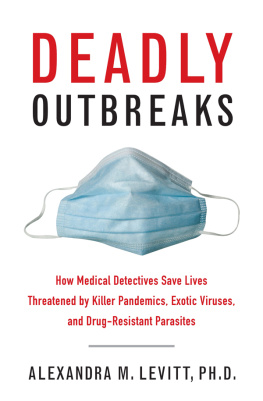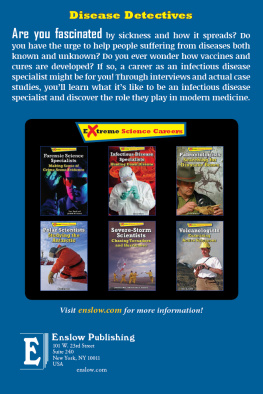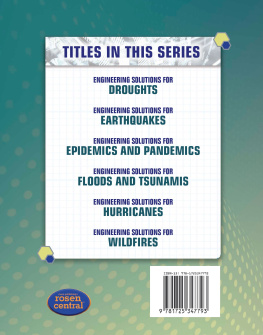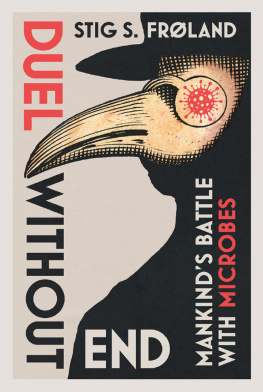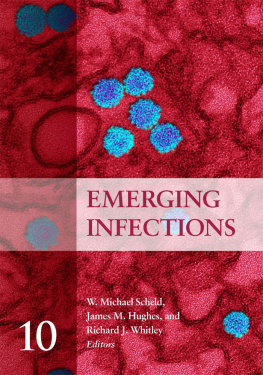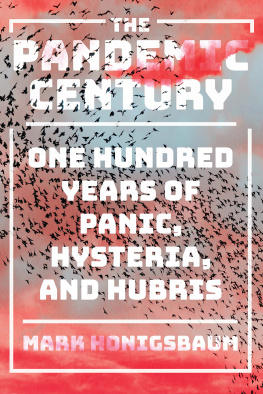Copyright 2013, 2015 by Alexandra M. Levitt, PhD
Foreword 2013 by Donald R. Hopkins, MD, MPH
All rights reserved. No part of this book may be reproduced in any manner without the express written consent of the publisher, except in the case of brief excerpts in critical reviews or articles. All inquiries should be addressed to Skyhorse Publishing, 307 West 36th Street, 11th Floor, New York, NY 10018.
Skyhorse Publishing books may be purchased in bulk at special discounts for sales promotion, corporate gifts, fund-raising, or educational purposes. Special editions can also be created to specifications. For details, contact the Special Sales Department, Skyhorse Publishing, 307 West 36th Street, 11th Floor, New York, NY 10018 or .
Skyhorse and Skyhorse Publishing are registered trademarks of Skyhorse Publishing, Inc., a Delaware corporation.
Visit our website at www.skyhorsepublishing.com.
10 9 8 7 6 5 4 3 2 1
Library of Congress Cataloging-in-Publication Data is available on file.
Cover design by Liz Driesbach
Print ISBN: 978-1-63450-266-5
Ebook ISBN: 978-1-5107-0526-5
Printed in the United States of America
Dedication
To Patrick McConnon, Kate McConnon, and Scott Fischer
and to medical detectives at state, local, and federal public
health agencies throughout the nation.
Contents
Foreword
In the latter part of the twentieth century, some believed antibiotics and vaccines had led to the conquest of most infectious diseases, and we could then turn our full attention to non-infectious, chronic conditions. Later, alarming experiences with HIV/AIDS, SARS, a virulent strain of influenza, multiple-drug resistant tuberculosis and other newly-recognized maladies corrected that misimpression. We now recognize that the struggle between humans, microbes and other aspects of our environment is long and ever-changing, but never ending.
Alexandra Levitts book, Deadly Outbreaks , is a fascinating account of seven frightening public health mysteries encountered in the United States between 1976 and 2007. Five of the episodes resulted from infectious diseases, ranging from an old foe, malaria, to a more recently recognized one, hantavirus; others were due to an autoimmune condition and drug overdoses in a cluster of infants. These are gripping, suspenseful stories that are exceptionally well-written and highly instructive. Public health practitioners and students will benefit from the hard-won victories of epidemiologists described here, and in my opinion, one can hardly hope to learn important lessons for the future in a more enjoyable way. At the end of each episode, the author reviews and describes explicit lessons illustrated by the events and the reactions to them. Beyond the interesting science and methodology of epidemiology per se , the reader experiences vicariously the personal and professional mindsets of epidemiologists as they deal with substantial medical, bureaucratic, political and legal challenges, sometimes simultaneously, often while being well aware of the high-stakes consequences of their findings. A frequent theme is to remind us all of how complex processes associated with modernization can create new pathways for spread of disease or injury. Another theme concerns the value and importance of communication between practitioners of different specialties, such as physician-epidemiologists and veterinarians, for example.
This volume is in the finest proud tradition of Paul de Kruifs Microbe Hunters (1926), which described the discovery of various microbes, and Berton Rouchs Eleven Blue Men (1953), which described outbreaks of different diseases. Like the latter, Deadly Outbreaks describes the learn-by-doing approach to the practice of epidemiology by disease detectives at the U.S. Centers for Disease Control and Preventions Epidemic Intelligence Service (EIS) and at state and local health agencies. It is a timely reminder that the battle with infectious diseases and other outbreaks is an on-going struggle, as epidemiologists in each age are challenged by newly-emerged pathogens, newly-realized pathways for old pathogens, and other unpredictable surprises. And for all the welcome and powerful new tools of computers, faster communications and more sophisticated statistical techniques, we see how much still depends on inquiring minds and dogged determination.
Donald R. Hopkins, MD, MPH
Vice President, Health Programs
The Carter Center
Authors Note, 2013
I wrote Deadly Outbreaks at the request of my friend and colleague Patrick J. McConnon, the former Executive Director of the Council of State and Territorial Epidemiologists (CSTE), to showcase field epidemiology as an exciting and rewarding career choice for students who are interested in science and math. I worked with Pat for many years at the Centers for Disease Control and Prevention (CDC), where he served as Associate Director for Emerging Diseases Program Development of the National Center for Infectious Diseases. In that capacity, Pat not only strengthened medical detection by designing innovative training programs, disease surveillance programs, and fellowships, but also handled operations and helped coordinate complex outbreak responses, including the CDCs responses to the 1993 hantavirus outbreak in the southwestern United States, the 1997 Rift Valley Fever outbreak in Kenya, and the 2001 anthrax incidents in Washington, DC. I dedicate Deadly Outbreaks to Pat, with affection and gratitude, as well as to Pats wife, Kate, and my husband, Scott. I also dedicate this book to medical detectives who work at public health departments throughout the country.
As a government employee, I would also like to make the following disclaimer:
The opinions and views expressed in this book are my own and do not reflect the views of the Centers for Disease Control and Prevention, the Department of Health and Human Services, or the U.S. Government.
Authors Note, 2014
Disease detectives learn something new from nearly every investigation of an infectious disease outbreak. In writing this introduction to the paperback edition of Deadly Outbreaks, I thought it might be useful to review investigations conducted since the book was publishedand to consider what these experiences have taught us. Here are my lessons learned:
One: Prepare for the Unexpected . The diversity of infectious disease outbreaks in the U.S. between September 2013 and December 2014 confirms thatwhen it comes to infectious microbeswe must always be ready for the unexpected. This fall, for example, a strain of enterovirusa common type of virus that typically causes mild cold-like symptomsunexpectedly caused severe respiratory disease in children (especially children with asthma) that required hospitalization and intensive care. Several unusual foodborne outbreaks occurred as well. Last winter, more than 630 people in twenty-nine states fell ill with salmonellosis after eating meals prepared from a contaminated frozen chicken product purchased at supermarkets across the country. The causative strains of bacteria were resistant to several common antibiotics. Another multi-state outbreak of gastrointestinal illness, which affected more than three hundred people, was traced to imported batches of fresh cilantro contaminated with Cyclospora , an intestinal parasite endemic to the tropical and sub-tropical regions of the world.
Something else unexpected: The New York Times recently reported on the surprising legal aftermath of a nationwide investigation of fungal meningitis that was winding down when Deadly Outbreaks was published. More than a year earlier, medical detectives had determined that a medical steroid product used to treat lower back pain and sciatica had been contaminated with a common mold called Exerholium rostratum . Injected into patients spines and joints, the mold caused spinal infections, meningitis, and strokes, leading to sixty-four deaths. On December 17, 2014, The New York Times stated that two executives of the Massachusetts compounding pharmacy that prepared the contaminated product have been charged with twenty-five acts of second-degree murder in seven states.

